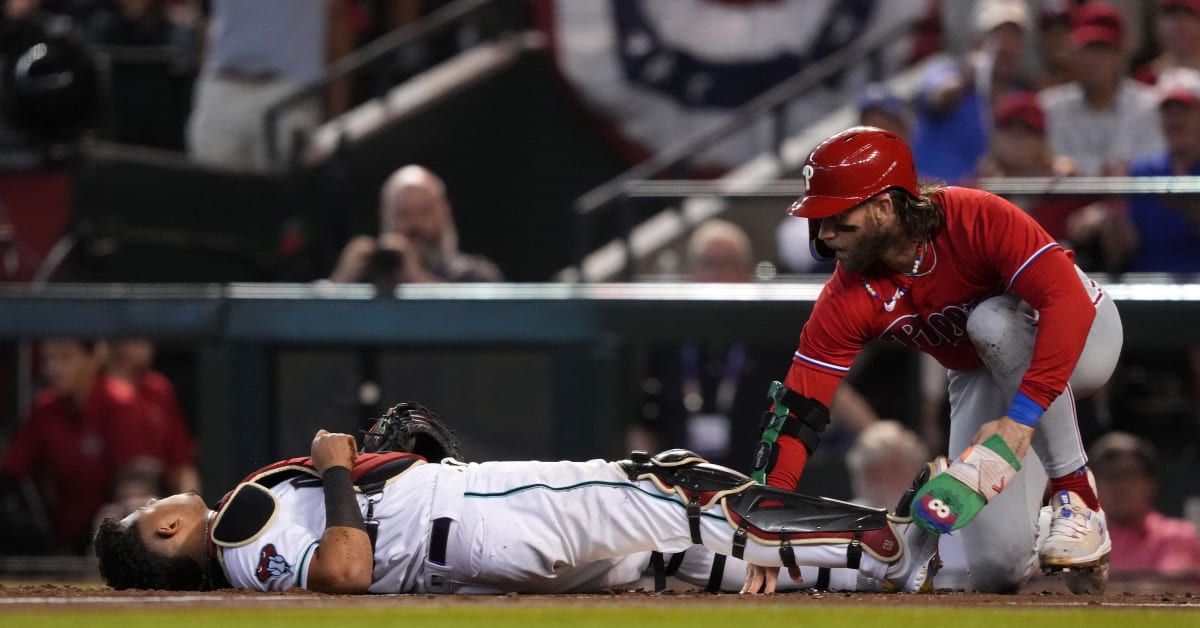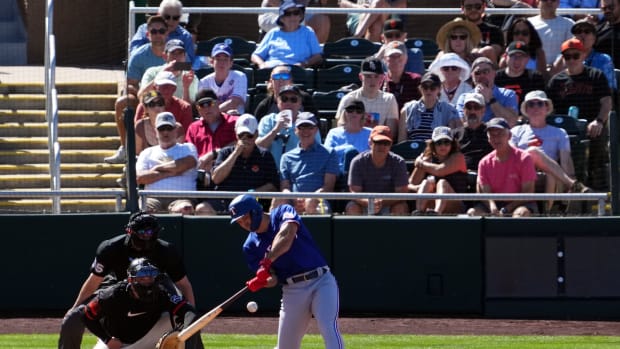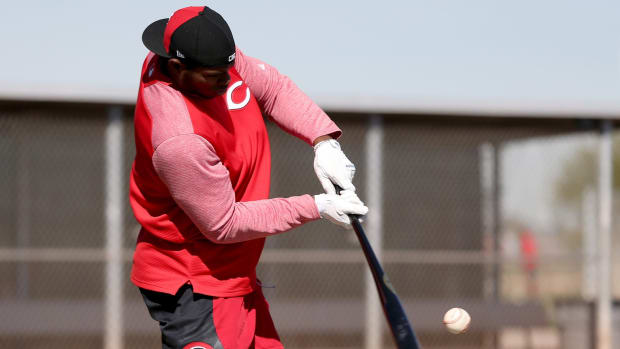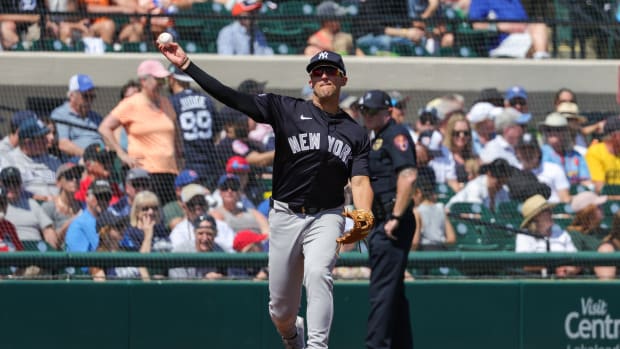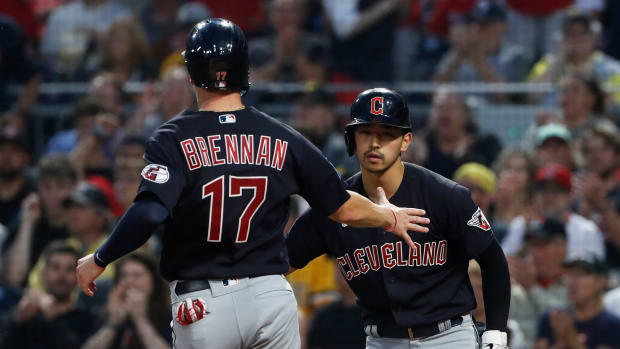Stealing Home Sparks Phillies, Robs Diamondbacks of NLCS Momentum
PHOENIX — For two days, the Phillies could not quite get their timing right. Sometimes they were late. Sometimes they were early. Even when everything synced up, it didn’t last. A hitter would connect with a ball perfectly or a pitcher would find his delivery precisely, and then whoever followed him would be unable to do the same thing. It was all the more frustrating because October is their favorite month, when they seem most able to be exactly where they need to be, exactly when they need to be there.
So it seems only right that the moment that propelled them to a 6–1 victory in Game 5 of the National League Championship Series, the one that gave them a 3–2 series lead heading back to Philadelphia, the one that may have saved their season, hinged entirely on being on time.
Six batters into Saturday’s game, with one run in, all-time great Bryce Harper at third base, Bryson Stott at first, two outs and an 0–1 count on batter J.T. Realmuto, they decided to go. Manager Rob Thomson had signaled to first base coach Paco Figueroa and third base coach Dusty Wathan that he wanted them to run the play, and they signaled to the runners.
So as Diamondbacks ace Zac Gallen delivered a fastball, Stott broke for second, drawing the throw from Diamondbacks catcher Gabriel Moreno, which was Harper’s cue to dash home. Second baseman Ketel Marte’s throw skipped out of Moreno’s glove, and Harper barreled into him. Everyone was safe. Harper, who turned 31 last week, became the oldest player to steal home in postseason since Jackie Robinson did it at 36 in Game 1 of the 1955 World Series against Whitey Ford’s Yankees. The Phillies led 2–0. In the end, it provided the winning run. The play is known as a steal/stop; maybe going forward they can refer to it in Philadelphia as a steal/Stott.
“They executed it perfectly,” Thomson says. “Stotter pulled up at the right time, and Harp got a really good break.”
It was a bold move, just the sort of thing that might return momentum to the Phillies, right?
“It wasn’t that gutsy,” says Figueroa. “It’s a play that, when it’s run well, it should be good enough to get the job done.”
It probably shocked the Diamondbacks, though, right?
“The play didn't surprise us,” says Arizona manager Torey Lovullo. “We were anticipating it. It was well-timed by our guys. We just didn't finish the play.”
But it says something about how willing the Phillies are to go for it, right?
“From the start of the playoffs, sort of the message to everybody was let’s put pressure on people,” says Thomson. “That doesn’t mean the double steals. It also means getting down the line, putting pressure on people with ground balls. … Putting pressure on the outfield, thinking about going first to third, good turns. Forcing them to maybe make some mistakes.”

The risky double steal gave the Phillies a 2–0 lead in the first inning.
Joe Camporeale/USA TODAY Sports
No, this was not a rash move called by a manager trying to spark his team. What the play actually says about the Phillies is that they know they are fundamentally sound, and all they need to do is play that way to regain control of the series. They hit mammoth home runs because they wait for their pitch and don’t miss it. They neutralize opposing hitters because they choose the right pitch and execute it.
The steal/Stott came down to simple math.
It was the first inning, when teams are likely to be more aggressive and try to cut down a base stealer. There were two outs, so it was unlikely the run would score otherwise. Gallen was an All-Star, so it was likely the Phillies would not have many more opportunities in scoring position. Moreno has a strong arm and was likely to try to use it. Third baseman Evan Longoria was playing back and was unlikely to get to the bag in time to cover it. The Diamondbacks would have to make two perfect throws—from Moreno to Marte back to Moreno—which they were unlikely to do.
“It’s a risk that we’re willing to take,” says Figueroa.
And then the Phillies started to look more like themselves. Kyle Schwarber hit a moonshot in the sixth inning; 10 pitches later, Harper did the same. Harper sprinted out of the box on an eighth-inning Baltimore chop, so when Marte lost the ball on the transfer, Harper was safe at first—just in time for Realmuto to homer him home. Ace Zack Wheeler, and the relievers who followed him, threw first-pitch strikes and kept the Diamondbacks hitters off-balance.
Both teams entered the game desperately needing length from their starting pitchers. Each club had used all its high-leverage relievers and most of its low-leverage ones in Game 4, and the Phillies had also used the top arms in Game 3. Both managers said before Game 5 that they would have to be smart about deploying their bullpens.
They risk fatigue by overusing them, but more than that, they risk familiarity: One 2022 analysis suggested that although pitch quality does not decline much, batters hit relievers much better the third time they see them in a postseason series. A forthcoming study finds that relievers are perhaps more than twice as vulnerable to overexposure over a series than starting pitchers are in a game. Moreno said after Game 4, when he drove in the winning run against previously unhittable Phillies fireman José Alvarado, that he believed familiarity had been the key.
In some ways, the Phillies’ two insurance runs in the eighth made life easier for everyone. Wheeler went seven innings, so only setup men Jeff Hoffman, Seranthony Domínguez and Matt Strahm had to pitch. Gallen managed six, and the lopsided score meant Lovullo could stay away from closer Paul Sewald, fireman Kevin Ginkel and setup man Ryan Thompson. You’d rather have won the game, of course, but there is value in preserving those arms.cit
But now the teams return to Citizens Bank Park, which Thomson said an opposing coach last year described as “four hours of hell.” Just in time.






























